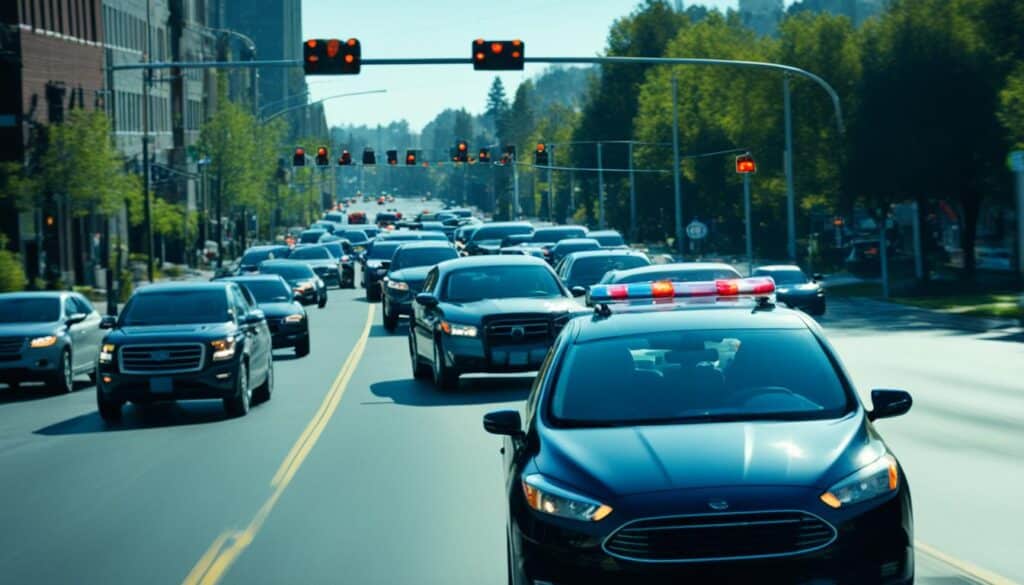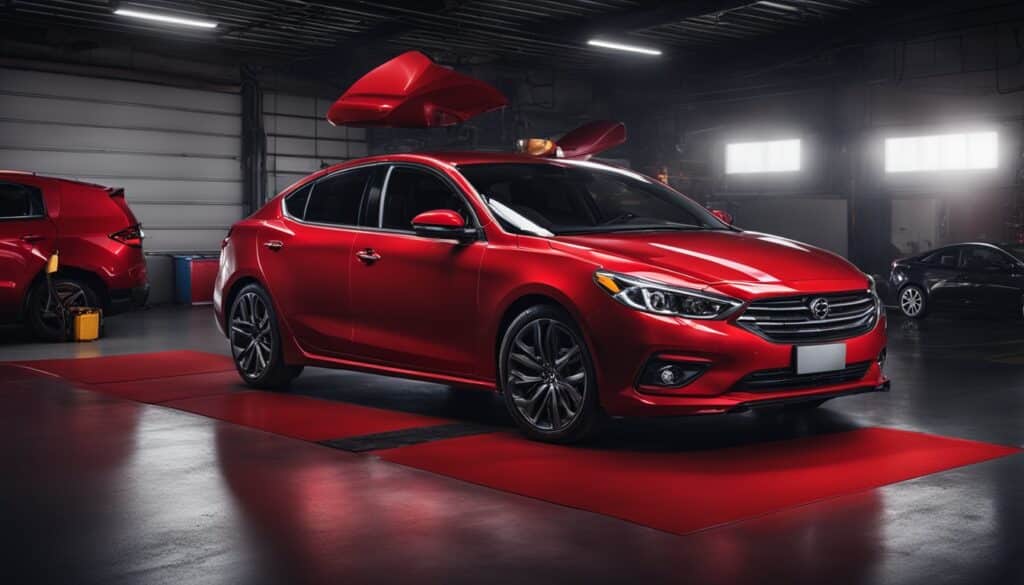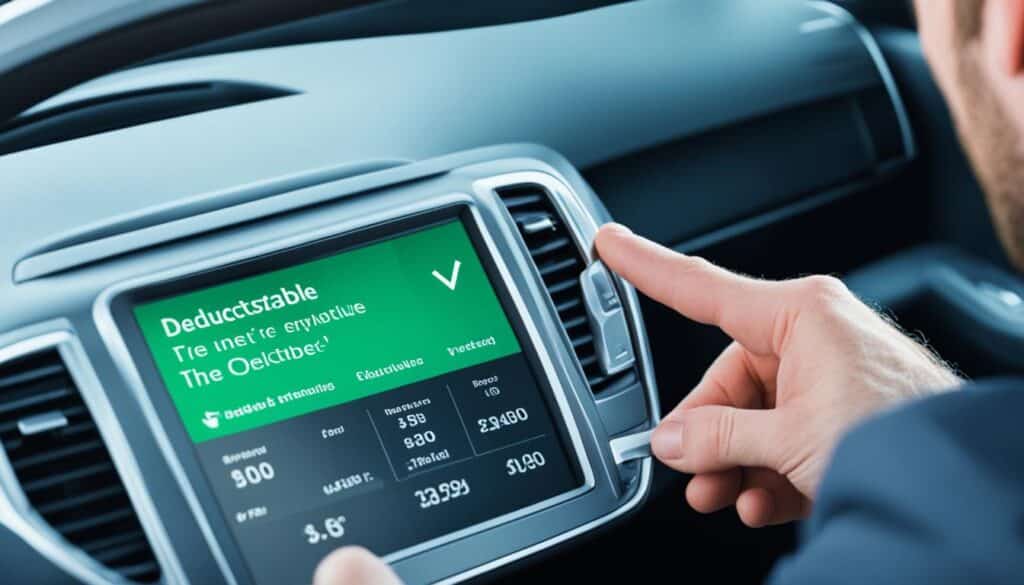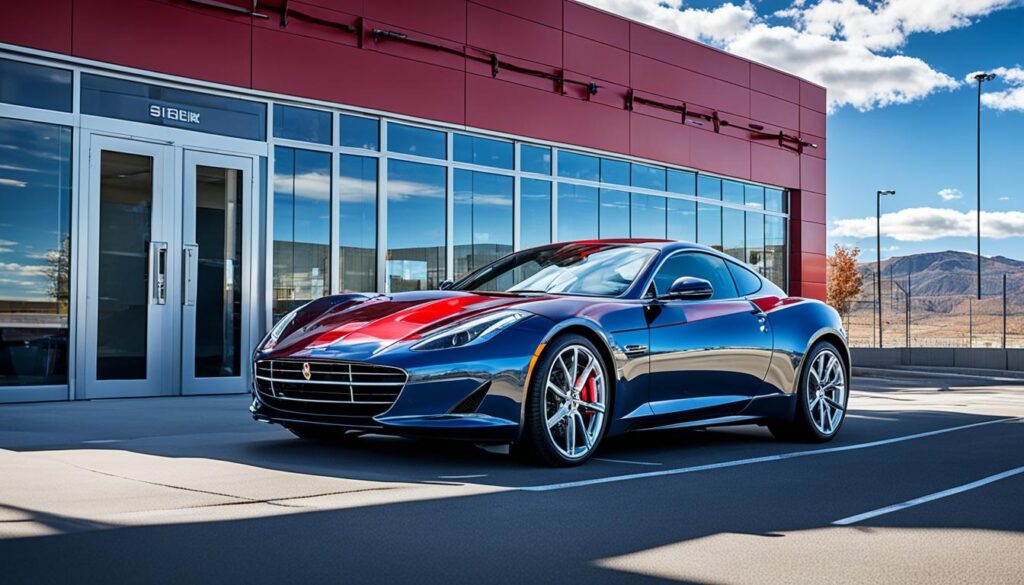Car insurance can seem complex, but it’s vital for drivers in the U.S. Whether you’re looking for a new policy or checking your current one, knowing the basics is crucial. This guide will help you understand car insurance. You’ll learn about state laws, liability limits, and extra coverage options. This way, you can make smart choices to protect your assets and get the right coverage.
Key Takeaways
- Car insurance is a critical financial protection for drivers in the United States.
- Understanding your state’s minimum liability requirements is the starting point for choosing the right coverage.
- Assessing your individual needs, such as vehicle value and driving habits, can help you determine the appropriate level of coverage.
- Liability coverage, collision and comprehensive coverage, and protection against uninsured/underinsured drivers are essential components of a comprehensive car insurance policy.
- Regularly reviewing your coverage and adjusting it as needed can help ensure you maintain the right protection for your assets and financial situation.
Understanding Car Insurance Requirements
When it comes to state car insurance requirements, the main focus is on liability coverage. This type of insurance is the least you must buy to follow the law in every state. It covers damages and injuries you cause to others in an accident.
State Minimum Liability Limits
The usual minimums are $25,000 for each person hurt and $50,000 for each accident. Also, there’s a $25,000 limit for damage to others’ property. But, these limits can change by state, so it’s key to check what your state requires. Having only the minimum coverage might not protect your assets well if an accident is serious.
| Coverage Type | Minimum Limits |
|---|---|
| Bodily Injury Liability | $25,000 per person / $50,000 per accident |
| Property Damage Liability | $25,000 |
Remember, these are the bare minimums. Drivers often choose to buy more liability coverage. This helps protect their assets more in case of an accident.
“Liability coverage is the foundation of your car insurance policy, but it’s essential to understand that the state minimums may not be enough to fully protect your assets.”
Assessing Your Car Insurance Needs
Looking at car insurance coverage needs is more than just meeting the minimum state laws. You should think about your financial situation, like your net worth and assets that need asset protection. This is key.
Make sure your liability limits are high enough to cover damages and injuries from an accident. You don’t want to risk your personal assets. Experts suggest setting liability limits that are higher than your net worth. For example, $250,000/$500,000/$250,000 for bodily injury and property damage is a good target.
By looking closely at your car insurance coverage needs, you can make a policy that protects you and meets the law. This way, you’ll have peace of mind and protect your assets if something unexpected happens on the road.
| Coverage Type | Minimum Limits | Recommended Limits |
|---|---|---|
| Bodily Injury Liability | $25,000/$50,000 | $250,000/$500,000 |
| Property Damage Liability | $25,000 | $250,000 |
Think about your net worth and make sure your liability limits are enough. This way, you can adjust your car insurance coverage to fit your needs and protect your financial assets.
“Protecting your financial future should be a top priority when choosing the right car insurance policy.”
Liability Coverage: Bodily Injury and Property Damage

Car insurance with liability coverage is key to protecting you and your stuff. It covers damages and injuries you cause to others if you’re at fault in an accident.
Bodily Injury Liability
This coverage pays for medical bills, lost wages, and pain of others if you cause an accident. It’s vital to have enough coverage because serious accidents can be very expensive.
Property Damage Liability
It covers the cost to fix or replace the other car and any property you damage in an accident. Having enough coverage is important to protect your assets from big repair bills.
Experts say you should have at least $250,000/$500,000 in bodily injury liability and $250,000 in property damage liability. This gives you strong protection and asset protection.
| Coverage Type | Recommended Limits |
|---|---|
| Bodily Injury Liability | $250,000/$500,000 |
| Property Damage Liability | $250,000 |
“Liability coverage is the cornerstone of a car insurance policy, as it pays for damages and injuries you cause to others.”
Car Insurance Policy: Additional Coverage Options
Liability coverage is the base of a car insurance policy. But, there are more options for protection. These extra coverages let you customize your policy for your needs and assets.
Comprehensive coverage covers damage from theft, vandalism, or natural disasters. Collision coverage fixes your car if you hit something else. These are great if you have a newer or pricier car.
Uninsured/underinsured motorist coverage helps if someone with no insurance hits you. It covers your medical and car repair costs when the other driver is at fault but has no insurance.
- Medical payments coverage pays for your and your passengers’ medical bills, no matter who was at fault.
- Personal injury protection (PIP) also covers medical bills, lost wages, and other costs from an accident.
Think about what you need and what you own to decide on extra coverages for your car insurance. Adding these options gives you more protection for you and your car.
| Coverage Type | What it Covers | Why it Matters |
|---|---|---|
| Comprehensive | Damage to your vehicle from events like theft, vandalism, or natural disasters | Protects your car when the damage is not caused by a collision |
| Collision | Repairs to your car if you hit another vehicle or object | Covers the cost to fix your car after an accident, regardless of fault |
| Uninsured/Underinsured Motorist | Medical expenses and vehicle repairs when the other driver is at fault but lacks adequate insurance | Safeguards you from the financial burden of an accident caused by an uninsured or underinsured driver |
| Medical Payments | Medical expenses for you and your passengers, regardless of fault | Helps cover medical costs after an accident without concerns about liability |
| Personal Injury Protection (PIP) | Medical costs, lost wages, and other expenses related to an accident | Provides broader coverage beyond just medical bills, helping you recover financially |
The Importance of Full Coverage

Liability coverage is the minimum you need by law. But, choosing coverage car insurance gives you more financial safety for your car. Collision and comprehensive coverage are key parts of full coverage. They protect you from unexpected events.
Collision and Comprehensive Coverage
Collision coverage helps fix or replace your car if you’re in an accident, no matter who caused it. It’s great for drivers with newer or more expensive cars. It saves money if you need repairs after a crash.
Comprehensive coverage covers damage from things not related to accidents, like theft, vandalism, or natural disasters. It’s a big help for drivers who can’t afford to buy a new car if theirs gets damaged or stolen.
Collision and comprehensive coverage together make up full coverage. This ensures your car is safe and you’re protected financially from surprises. For drivers who want to keep their car safe and secure, full coverage insurance is a smart choice.
“A full coverage car insurance policy can offer invaluable peace of mind, protecting your vehicle and your financial well-being in the event of an accident or unexpected incident.”
Protecting Yourself from Uninsured/Underinsured Drivers
In an ideal world, all drivers would have enough liability limits to cover damages or injuries from accidents. Sadly, this isn’t true. About 1 in 8 drivers lack insurance, putting others at risk.
Being hit by an uninsured driver can be scary. Uninsured motorist coverage can help. It pays for your injuries and damages if the other driver has no insurance. Underinsured motorist coverage also comes in handy if the other driver’s insurance is not enough to cover your costs.
These coverages are not required everywhere, but they’re crucial in places with many uninsured drivers. Having enough uninsured/underinsured motorist limits can protect your assets if you’re hit by someone without insurance.
| Coverage Type | What It Covers | Why It Matters |
|---|---|---|
| Uninsured Motorist Coverage | Pays for your injuries and damages when the at-fault driver has no insurance | Protects you if you’re hit by an uninsured driver |
| Underinsured Motorist Coverage | Covers your costs when the at-fault driver’s liability limits are insufficient | Safeguards your assets if the other driver’s insurance is inadequate |
“Uninsured and underinsured motorist coverage can be a vital safeguard when you’re on the road. These coverage types can protect your finances and your well-being in the event of an accident with an uninsured or underinsured driver.”
Medical Payments and Personal Injury Protection
Car insurance offers two important coverages: medical payments (MedPay) and personal injury protection (PIP). MedPay covers medical costs. PIP covers lost wages, funeral expenses, and home care services too.
MedPay pays for medical bills, no matter who caused the accident. It’s great if you have high deductibles or health insurance gaps. PIP gives more benefits, like lost wages and other injury-related costs.
In some places, you must have MedPay or PIP in your car insurance. Even if not required, they’re good to have. They can protect you from the financial hit of an accident.
| Coverage Type | What It Covers | Key Considerations |
|---|---|---|
| Medical Payments (MedPay) |
|
|
| Personal Injury Protection (PIP) |
|
|
When looking at your car insurance, think about your medical and financial needs. Choosing the right MedPay or PIP coverage can protect you in an accident. It also helps reduce your out-of-pocket costs.
Choosing the Right Deductibles

When picking car insurance deductibles, think about how your monthly payments and out-of-pocket costs will change. The deductible is what you pay before your insurance helps out, usually between $250 to $1,000, or more.
Choosing a higher comprehensive coverage deductible or collision coverage deductible can lower your monthly costs. But, you’ll have to pay more if you file a claim. On the other hand, a lower deductible means higher monthly payments but more protection when you need it.
Finding the right balance between your budget and how much risk you can handle is key. Think about your savings, how much you can afford to pay out-of-pocket, and how likely you are to need to file a claim. This will help you pick a deductible that’s affordable yet still covers your needs.
| Deductible Level | Impact on Monthly Premiums | Out-of-Pocket Expenses |
|---|---|---|
| $250 | Higher premiums | Lower out-of-pocket costs |
| $500 | Moderate premiums | Moderate out-of-pocket costs |
| $1,000 | Lower premiums | Higher out-of-pocket costs |
By thinking about your car insurance deductibles carefully, you can find a balance between saving money and being protected. This ensures you’re covered if something unexpected happens.
Car Insurance Policy: Protecting Your Assets

Car insurance is key to protecting your financial assets. Your liability limits cover injuries and damage to others. Make sure these limits are higher than your net worth to protect your home and savings from accidents.
If your liability limits aren’t enough, consider umbrella insurance. It adds extra protection beyond your car and home insurance. This way, your assets stay safe from lawsuits or claims.
Review your insurance and net worth often to keep your protection right. Asset protection is vital. Knowing about liability limits and umbrella insurance helps you protect your finances and your car insurance works better for you.
“Protecting your assets is not just about car insurance – it’s about taking a holistic approach to your financial security.”
Maximizing Your Liability Limits
Choosing the right liability limits is key. Aim for limits that match or exceed your assets. This keeps your wealth safe if you’re legally responsible for an accident.
The Benefits of Umbrella Insurance
Umbrella insurance adds extra protection. It covers you when your main insurance limits are used up. It’s vital if you have a lot of assets or are more likely to be liable.
Reviewing Your Coverage Regularly
Change your financial situation? Then check your car insurance often. Look at your liability limits and umbrella insurance needs. Make sure your policy still protects your assets.
Reviewing Your Coverage Regularly
Life changes often mean you need to update your car insurance. Events like getting married, having kids, buying a home, or switching jobs affect what coverage you need. Also, as your wealth grows, you might need more liability coverage to protect your money.
It’s smart to set a reminder to check your car insurance policy every year or after big life changes. This keeps you aware of your coverage updates. It also makes sure your asset protection matches your new needs.
- Review your policy every year to make sure it still fits your life
- Adjust your coverage limits as your wealth and assets increase
- Update your policy after big life events, like marriage, a new home, or a new job
- Look for ways to improve your coverage and find discounts
“Regularly reviewing your car insurance policy is a smart financial decision that can help you stay protected as your life evolves.”
Adding car insurance review to your financial routine is wise. It helps you keep up with your changing needs. This ensures your coverage keeps giving you the asset protection you and your family need.
Also Read: Dental Insurance: Protect Your Smile
Conclusion
Understanding your car insurance policy is key to protecting your money. Know your state’s liability limits and what you need for coverage. This way, you can make a policy that keeps your assets safe if something unexpected happens.
Choosing the right types of coverage, like liability, collision, and comprehensive, prepares you for accidents. It covers damage to your car or if you hurt someone else. Also, adding protection for uninsured/underinsured drivers and medical payments boosts your coverage and protection.
It’s important to check your car insurance policy often and change it as your life and money situation change. Being careful and active lets you drive with confidence, knowing your assets are safe. With the right car insurance policy, you can face the future with security and peace of mind get an auto insurance quote general insurance free auto insurance quote may vary by state affordable car insurance auto insurance policy save on auto insurance liability insurance general car insurance file a car insurance claim get a free online auto insurance quote online.
FAQs
Q: What is auto insurance and why do I need it?
A: Auto insurance is a contract between you and an insurance company that provides financial protection against physical damage and bodily injury resulting from traffic collisions, as well as liability that could arise from incidents involving your vehicle. You need car insurance to comply with state laws, protect your assets, and cover costs associated with accidents.
Q: How can I get a car insurance quote?
A: You can get a car insurance quote by contacting insurance companies directly, using online quote tools, or speaking with an insurance agent. Many companies offer a free car insurance quote that allows you to compare rates and coverage options.
Q: What types of car insurance are available?
A: There are several types of car insurance, including liability coverage, collision coverage, comprehensive coverage, uninsured/underinsured motorist coverage, and personal injury protection. Each type of coverage serves a different purpose and can be customized to fit your needs.
Q: How can I compare car insurance quotes?
A: To compare car insurance quotes, you can gather quotes from multiple insurance companies, look for online comparison tools, or consult with an insurance agent. This process allows you to evaluate coverage options, premiums, and discounts to find the best car insurance for your situation.
Q: What factors affect car insurance rates?
A: Car insurance rates can vary by state and are influenced by several factors, including your driving history, the type of vehicle you drive, your age, credit score, and the amount of coverage you select. Additionally, car insurance companies may offer discounts that could save you money on your policy.
Q: Can I customize my car insurance policy?
A: Yes, you can customize your car insurance policy by selecting the types of coverage you need, adjusting deductibles, and adding optional coverages, such as rental car reimbursement or roadside assistance. This helps ensure that your auto insurance coverage meets your specific needs.
Q: What should I do if I need to file an insurance claim?
A: If you need to file an insurance claim, you should contact your insurance company as soon as possible. Be prepared to provide details about the incident, including the date, time, location, and any other parties involved. Your insurance agent will guide you through the claims process.
Q: How can I find the best car insurance for my needs?
A: To find the best car insurance, research various insurance companies, read reviews, and compare coverage options and rates. Getting a car insurance quote from multiple providers can help you identify which company offers the best balance of price and coverage for your specific situation.
Q: Are there any auto insurance discounts available?
A: Yes, many insurance companies offer auto insurance discounts that could save you money. Common discounts include safe driver discounts, multi-policy discounts, good student discounts, and discounts for vehicles equipped with safety features. Be sure to ask your insurance agent about available discounts when getting a quote.
Q: How do I start my car insurance quote?
A: To start your car insurance quote, visit the website of your preferred insurance company or use an online comparison tool. You will need to provide some basic information about yourself, your vehicle, and your driving history to receive an accurate quote today.
Source Links
- https://www.forbes.com/advisor/car-insurance/how-much-car-insurance-do-you-need/
- https://www.nerdwallet.com/article/insurance/how-much-car-insurance-you-need
- https://www.progressive.com/answers/how-much-car-insurance-do-i-need/